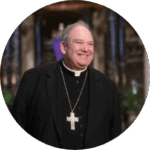Juntos en el camino: Palabras semanales del Arzobispo Hebda
 The kitchen was the heart of our family home. My mom was a prodigious baker and seemed to be tethered to the stove, always just a few steps away from our rotary phone. (Those of you who are young can ask your grandparents what life was like before cellphones.) Tucked into the corner of the kitchen between the oven and the phone was a small table for important reading material—the weekly bulletin, a few stray copies of the National Geographic, the inserts from the Sunday edition of the Pittsburgh Post Gazette, the annual directory from our parish, and a thick dog-eared book that I came to know as the documents of the Second Vatican Council. As a young boy, I could never imagine reading a book that thick, and it struck me that my mom would read a few pages as she was waiting for a cake to cool or the bread to rise.
The kitchen was the heart of our family home. My mom was a prodigious baker and seemed to be tethered to the stove, always just a few steps away from our rotary phone. (Those of you who are young can ask your grandparents what life was like before cellphones.) Tucked into the corner of the kitchen between the oven and the phone was a small table for important reading material—the weekly bulletin, a few stray copies of the National Geographic, the inserts from the Sunday edition of the Pittsburgh Post Gazette, the annual directory from our parish, and a thick dog-eared book that I came to know as the documents of the Second Vatican Council. As a young boy, I could never imagine reading a book that thick, and it struck me that my mom would read a few pages as she was waiting for a cake to cool or the bread to rise.
It was a highly valued reference tool when she and her friends would get together over a few beers in a smoke-filled kitchen to debate the changes that they were experiencing in the Church. They weren’t ivory-tower theologians, but moms who were passionate about the life of faith. The book remained on that table, a trusted friend, for decades.
In these weeks, the Church is celebrating the 60th anniversary of the closing of the Second Vatican Council, a global gathering of bishops that produced 16 documents over three years, concluding on December 6, 1965. Church historians often write that it takes decades for the teachings of a Council to “sink in.” Not surprisingly, the documents of the Council continue to be the touchstone for papal teaching. Pope St. John Paul II had participated first-hand in the Council as the bishop of Krakow, while Pope Benedict had participated as a theological expert. As a Jesuit preparing for ordination, Pope Francis devoured the documents as they were being issued, and they clearly shaped his priesthood and his ministry as bishop and pope. While Pope Leo was, like me, just a boy when they were promulgated, they have clearly influenced his understanding of the Church as well.
Along with faith leaders from around the world, Pope Leo has recently marked the 60th anniversary of Nostra Aetate, the groundbreaking document that has guided the Church’s relationship with non-Christians. The document offered a clear articulation of the Church’s recognition that we should reject “nothing that is true and holy” in other religions, noting that there are elements in other faiths that “reflect a ray of that Truth which enlightens all.”
Over the last 60 years, the document has been particularly relevant for fostering a closer relationship between Catholics and Jews. The document recognized that Christians and Jews have a “common spiritual patrimony” and unambiguously asserted that there is no place for displays of antisemitism.
I am very grateful to the Jewish Community Relations Council of Minnesota and the Dakotas for spearheading a local celebration of the Nostra Aetate anniversary. We were blessed by a presentation from Rabbi Abraham Skorka, the famous rabbi from Argentina who was a close friend of Pope Francis, having co-authored with him a best-selling book in 2010, On Heaven and Earth. I loved hearing about their work together in Buenos Aires and appreciated his reflections on the importance of dialogue and fraternal accompaniment.
We continue to be blessed by the closeness of our Jewish brothers and sisters here in Minnesota. They were well-represented at the prayer service held on the night of the shooting at Annunciation, and Rabbi Marcia Zimmerman’s almost-poetic reflection at the interfaith service held at the Basilica on the following day continues to give me food for thought. The congregation at Adath Jeshurun in Minnetonka, moreover, could not have been more welcoming at the 60th anniversary celebration. Please join me in praying that we Catholics might continue to grow in our understanding of Nostra Aetate and the other documents of Vatican II.
Únete a más de 85,000 católicos que reciben mensualmente Juntos en el viaje vídeos del arzobispo Hebda. Si se suscribe, también recibirá su boletín Weekly Word:
Lea este mensaje en Flocknote.
